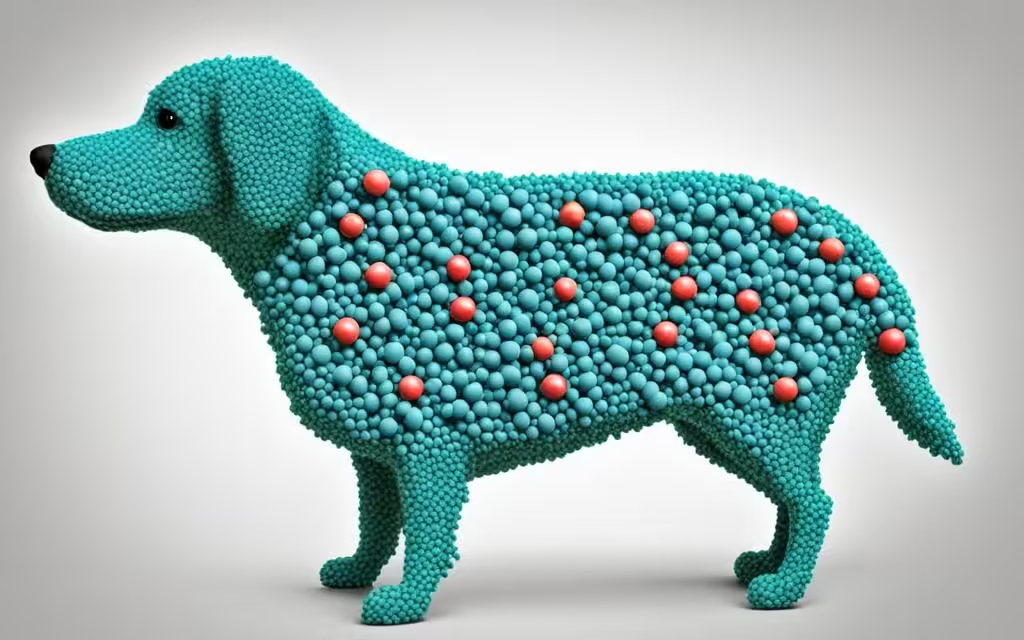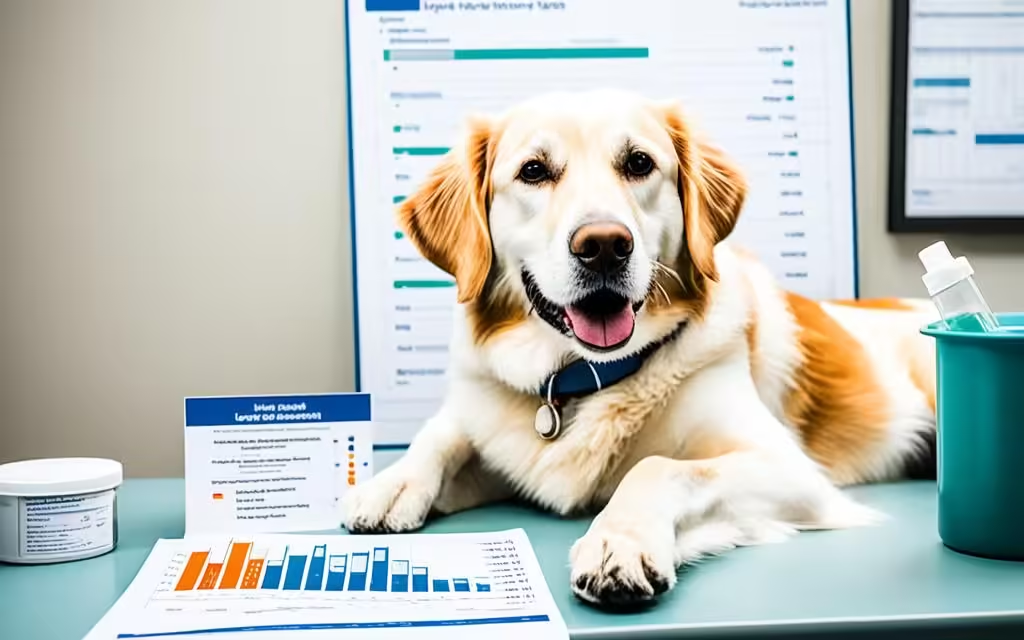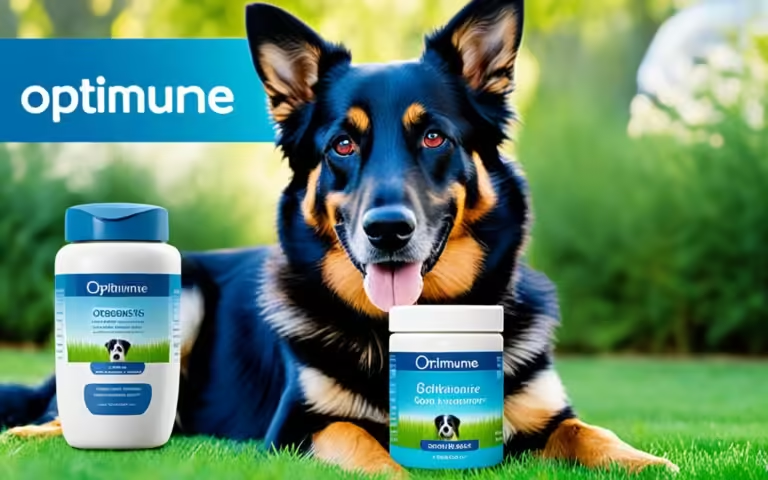Ursodiol for Dogs: Liver Support Medication
Did you know over 90% of dogs in the U.S. may face liver disease at some point1? This fact shows how crucial treatments like ursodiol are. Ursodiol is a bile acid that helps with many liver and gallbladder issues in dogs. It’s a natural way to support liver health and ease cholesterol problems in our pets.
Ursodiol, sold as Actigall® and Urso®, is a key medicine in vet care. It helps dogs with chronic hepatitis, gallstones, and other liver problems2. Knowing about this medicine lets pet owners work with vets to care for their dogs well.
Key Takeaways
- Ursodiol is a bile acid used to treat liver and gallbladder issues in dogs.
- It dissolves cholesterol, stops it from being absorbed, and lowers harmful bile acid levels in the liver.
- It’s often given for chronic hepatitis, gallstones, and other liver problems in dogs.
- There are different dosages of ursodiol available for each pet’s needs.
- It’s important to give ursodiol with food for the best results.
Table of Contents
What is Ursodiol?
Ursodiol, also known as ursodeoxycholic acid, is a bile acid found in nature. It’s a key medicine in vet care. Vets use it off-label to treat liver and gallbladder issues in dogs, cats, horses, and birds3.
Understanding Ursodiol’s Role in Veterinary Medicine
Vets often prescribe ursodiol for liver and gallbladder diseases. It helps by making more bile flow, lowering bile cholesterol, and dissolving gallstones4. It’s great for treating cholestasis, chronic hepatitis, and liver damage in pets4.
Common Brand Names and Forms of Ursodiol
Ursodiol goes by names like Actigall®, Urso®, and Ursofalk®. You can take it as tablets, capsules, or liquid. Vets might also make special forms for certain pets4.
But, ursodiol isn’t FDA-approved for pets. Yet, vets use it a lot for liver and gallbladder problems in pets, and it often works well5.
It’s smart to check liver function tests before and during ursodiol treatment4. This keeps the treatment safe and effective for your pet.
In short, ursodiol is a key bile acid in vet medicine. It helps with liver and gallbladder issues in many pets. Knowing how to use it and its effects is important for pet owners and vets345.
Benefits of Ursodiol for Dogs
Ursodiol is a key medicine for dogs with liver and gallbladder issues. It helps with chronic hepatitis, cholesterol gallstones, and other problems.
Treating Gallbladder and Liver Conditions
Ursodiol treats many gallbladder and liver issues in dogs. It lowers liver cholesterol and absorbs less from food, helping with cholesterol gallstones6. It also breaks down cholesterol, dissolving gallstones6.
It also has anti-inflammatory and antioxidant effects, great for dogs with chronic liver issues like hepatitis6. Ursodiol targets the root causes of these problems, easing symptoms and boosting liver health in dogs.
Dissolving Gallstones and Reducing Cholesterol
Ursodiol’s effects on cholesterol make it great for dissolving gallstones in dogs6. It reduces gallstone size and number, improving dog health.
It also lowers cholesterol in dogs with high levels, reducing health risks6. This helps with heart and metabolic health in dogs.
| Ursodiol Formulations for Dogs | Dosage | Potential Side Effects |
|---|---|---|
| 300 mg capsules, 250 mg or 500 mg tablets | 2.5 to 7 mg per pound of body weight, given orally twice a day | Allergic reactions, hives, breathing difficulties, facial swelling, gastrointestinal distress, headaches, vomiting, or diarrhea |
While ursodiol is usually safe, watch for side effects like allergies and stomach issues. Close monitoring is key to keep dogs safe and healthy.
“Ursodiol has become an invaluable tool in the veterinary arsenal for managing a range of liver and gallbladder conditions in dogs, offering effective and safe treatment options.”
In summary, ursodiol is a top choice for dog health care. It treats many conditions, dissolves gallstones, and lowers cholesterol, making dogs healthier678.
Administering Ursodiol for Dogs
Ursodiol, also known as ursodeoxycholic acid, is a common medicine for dogs. It helps with liver and gallbladder health. It comes as tablets, capsules, or a liquid. The right amount and how often you give it depends on the dog’s condition and needs, as the vet will say9.
Dosage and Frequency Guidelines
Dogs get 2.5 to 7 mg of ursodiol per pound, twice a day9. Cats get 5 to 7 mg per pound once a day10. You can find it in a 300 mg capsule or a 250 mg tablet, depending on the dog’s needs9.
Proper Administration Techniques
Give ursodiol with food to help it go down better and taste less bitter. Make sure to measure liquids right and follow your vet’s advice for giving it out safely. There’s no special vet version of ursodiol, but human forms like Actigall® and Urso® are okay for pets9.
Keep an eye on liver tests for pets taking ursodiol. It’s not officially approved for pets but vets can prescribe it. Working closely with your vet is important for using ursodiol safely and effectively in dogs9.
Knowing how to give ursodiol the right way helps pet owners help their dogs. Working with your vet is key to making sure the medicine works well9.
Potential Side Effects and Precautions
Ursodiol is usually safe for pets, but owners should know about possible side effects11. Common issues include belly pain, hair loss, and upset stomach11. Less serious problems like constipation and headaches can also happen12.
Common Side Effects to Watch For
Keep an eye on your dog for any bad reactions to ursodiol. Look out for weakness, swollen limbs, and signs of infection13. Rarely, jaundice or abnormal test results can happen13.
Contraindications and Drug Interactions
Don’t give ursodiol to rabbits, guinea pigs, or similar animals as it can be harmful11. Be careful with dogs that have ongoing liver issues11. Ursodiol might not work well with some medicines, like certain antacids11. It can also be affected by other drugs, making it less effective11.
Always talk to a vet before giving ursodiol to your dog13. It’s good to check liver function tests regularly for dogs on this medicine, especially those with liver problems13.

“While ursodiol is generally well-tolerated, pet owners should be aware of potential side effects associated with this veterinary medication.”
Ursodiol for Dogs: Liver Support Medication
Ursodiol is a key medicine for dogs with liver and gallbladder issues. It lowers cholesterol, breaks down gallstones, and reduces swelling. This makes it a vital tool for helping dogs with liver problems14.
This bile acid medicine comes in 300mg capsules and 250mg tablets. This gives pet owners options for how much to give their dogs14. Vets usually give Ursodiol to dogs at a dose of 2.5-7 mg/lb (5-15 mg/kg) twice a day. The exact dose can change based on the dog’s needs15.
Studies show Ursodiol is effective for many liver issues in dogs. These issues include chronic hepatitis, acute liver failure, and more2. It’s mainly used in dogs, not cats, and is well-studied in this species2.
“Ursodiol is an essential medication for supporting liver health in canine patients, offering a range of benefits from reducing cholesterol to dissolving gallstones.”
Ursodiol is usually safe, but some dogs might get mild stomach issues like nausea or diarrhea1415. If a dog takes too much, it’s important to get vet help fast. This is because they might have worse stomach problems15.
Don’t give Ursodiol to rabbits, guinea pigs, or other animals with special digestive systems. It might not work well for them142. Also, it could interact with some other medicines. So, vets need to think carefully before mixing it with other treatments15.
Overall, Ursodiol is a powerful medicine that helps dogs with liver issues a lot. By knowing how it works, how to give it, and its possible side effects, pet owners and vets can make sure dogs get the best care for their liver problems14215.
Monitoring and Follow-Up Care
When a dog gets ursodiol, the vet will keep an eye on its liver health. This includes regular blood tests and checks16. Before starting the treatment, a liver panel test is done. Then, tests are done every month, three months, and every six months after that16. The vet might also use imaging like an ultrasound to check the liver and gallbladder.
Routine Testing and Evaluation
Liver function testing is key when a dog is on ursodiol16. Dogs with liver issues often show high levels of ALT activity in blood tests16. Testing liver tissue for copper is also important to see how severe the condition is16. Labs that test for heavy metals in animals are crucial in diagnosing these liver problems in dogs16.
Periodic imaging, like an ultrasound, helps check the dog’s liver and gallbladder health16. This makes sure the ursodiol is working right and breaking down any gallstones.
Regular veterinary follow-up is key for canine health management with ursodiol16. Vets watch the dog’s progress and change the treatment as needed for the best results17.
| Test | Purpose | Frequency |
|---|---|---|
| Liver Panel | Assess liver function | Prior to starting ursodiol, then 1 month, 3 months, and every 6 months |
| Liver Ultrasound | Monitor liver and gallbladder health | As needed by veterinarian |
| Liver Copper Analysis | Determine copper levels in liver tissue | As needed by veterinarian |
By keeping a close watch on a dog’s ursodiol treatment, vets can make sure it’s working well. This helps them adjust the treatment as needed16. This careful approach to canine health management makes sure the ursodiol therapy works best and keeps the pet healthy16.

Comparing Ursodiol to Other Liver Medications
Ursodiol is often given to dogs for liver and gallbladder issues. It can be compared to other drugs based on how well they work, their cost, and their side effects18. Vets look at each dog’s needs and condition to pick the best treatment, which might include ursodiol or other liver drugs18. The cost and where to find the drugs also matter in making decisions.
Efficacy, Cost, and Side Effect Considerations
Ursodiol, also known as UDCA, helps treat liver and gallbladder problems in humans and animals1819. For example, it can slow down liver cirrhosis in some patients, keeping them from getting worse19. It also helps pregnant women with liver issues by lowering bile acid levels and improving health for both mom and baby19.
Ursodiol is usually cheaper than some other liver drugs20. It comes in different strengths, and the dose depends on the dog’s weight18. Sometimes, vets can get special ursodiol from pharmacies that make custom doses for dogs18.
Most dogs and cats can take ursodiol without big problems18. But, it might cause diarrhea, belly pain, or other stomach issues18. Other drugs like azathioprine and methotrexate are used for liver issues in humans and might have different side effects20.
Vets look at many things when choosing between ursodiol and other liver drugs for dogs. They think about how well the drug works, its cost, and its side effects to find the best treatment for the dog’s liver health and overall health181920.
Proper Storage and Handling
Storing and handling ursodiol right is key for its effectiveness and pet safety21. Keep it at room temperature, between 68-77°F (20-25°C), and in a sealed container21. This protects it from moisture and light. If you have a special version of ursodiol, check the pharmacy’s instructions21.
When giving ursodiol to your dog, handle it carefully. Wash your hands before and after21. This keeps both you and your pet safe, supporting good veterinary care21.
Ursodiol comes in different forms like capsules and tablets, even a suspension21. The way you store and handle it depends on the form your vet prescribes22. Always follow your vet’s or the pharmacy’s advice for the best care of this liver support medicine21.
| Ursodiol Formulation | Strength | Tablet/Capsule Shape | Tablet/Capsule Color | Imprint |
|---|---|---|---|---|
| Capsule | 250mg, 300mg | Oval, Oblong | White, Pink, Peach, Yellow | Logos, Numbers, Letters |
| Tablet | 150mg, 250mg, 400mg, 500mg | Oval, Oblong, Elliptical | White, Pink, Peach, Yellow | Logos, Numbers, Letters |
By storing and handling ursodiol correctly, pet owners help keep their dogs healthy and safe21. This is a key part of caring for your pet and managing their medicine21.
Conclusion
Ursodiol is a key medicine for dogs with liver and gallbladder problems. It helps lower cholesterol, dissolve gallstones, and reduce inflammation. This makes it a top choice for dogs with these health issues23.
When a vet prescribes ursodiol, it can greatly help dogs with liver or gallbladder problems. It’s safe, with only a few dogs experiencing side effects like vomiting or diarrhea24.
The veterinary community sees ursodiol as a powerful tool for dogs. By knowing how it works, dosage, and safety, pet owners and vets can help dogs with liver issues25.
What is ursodiol?
Ursodiol is a bile acid used to treat gallbladder and liver diseases. It helps with symptoms like gallbladder mucocele and chronic liver inflammation. It’s used in cats, dogs, horses, and birds, but not for their usual health issues.
How is ursodiol used in veterinary medicine?
Veterinarians use ursodiol for dogs with liver and gallbladder problems. This includes chronic hepatitis, gallstones, and liver shunts. It also helps with cholesterol gallstones.
What are the common brand names and forms of ursodiol?
You can find ursodiol under the names Actigall®, Urso®, and Ursofalk®. It comes as tablets, capsules, or liquid. Some pharmacies make special forms for certain pets.
How does ursodiol benefit dogs with liver and gallbladder conditions?
Ursodiol lowers liver cholesterol and reduces dietary cholesterol absorption. It helps dissolve gallstones and has anti-inflammatory effects. This is good for dogs with chronic liver issues like hepatitis.
How is ursodiol administered to dogs?
Dogs take ursodiol by mouth, as tablets, capsules, or liquid. The dose depends on the condition and the dog’s needs. Giving it with food helps with absorption and taste.
What are the potential side effects of ursodiol?
Ursodiol is usually safe but can cause diarrhea, stomach discomfort, and nausea. It’s not safe for rabbits, guinea pigs, or similar animals as it can harm them.
How is the effectiveness of ursodiol monitored in dogs?
Vets check on dogs taking ursodiol with blood tests and evaluations. They might test liver function before starting and then regularly, like every three or six months.
How does ursodiol compare to other liver medications for dogs?
Vets pick the best treatment for each dog, considering their needs and condition. They might choose ursodiol or other medications. The cost and availability of each option also matters.
How should ursodiol be stored and handled?
Keep ursodiol at room temperature, between 68-77°F (20-25°C), in a sealed container. Wash hands after handling it to keep everyone safe.
Why is ursodiol so expensive?
Ursodiol is expensive due to factors like limited competition among manufacturers, the complexity of its production, and its classification as a specialty drug used for specific conditions
Does ursodiol cause weight gain?
Yes, weight gain can be a side effect of ursodiol, although it is not very common
How long can you take ursodiol?
The duration for taking ursodiol varies based on the condition being treated. For dissolving gallstones, it may be taken for up to two years. Always follow your doctor’s guidance on the duration of use.
How long does it take for ursodiol to work?
Ursodiol may start to show effects within a few days, but noticeable improvements can take several weeks.
How long does it take for ursodiol to dissolve gallstones?
It can take several months to up to two years for ursodiol to dissolve gallstones, depending on their size and composition.
Source Links
- URSODIOL COMPOUNDED Capsule for Dogs & Cats, 400-mg, 90 Capsules – Chewy.com
- Ursodiol for Veterinary Use – Wedgewood Pharmacy
- Ursodiol | VCA Animal Hospitals
- Ursodiol
- Ursodiol For Dogs and Cats » AVRIO Pharmacy
- Uses, Dosage & Side Effects
- Ursodiol (Actigall)
- Ursodiol For Dogs: Uses, Dosage, & Side Effects
- Ursodiol (Actigall®, Urso®) for Dogs and Cats
- Drugs That Affect Digestive Functions in Monogastric Animals – Drugs That Affect Digestive Functions in Monogastric Animals – Merck Veterinary Manual
- Ursodiol: Package Insert – Drugs.com
- Ursodiol: Uses & Side Effects
- Ursodiol: Side Effects, Uses, Dosage, Interactions, Warnings
- Ursodiol (Generic)
- Ursodiol 250 mg (sold per tablet) | 1800PetMeds
- Diagnosing and treating canine copper-associated hepatopathies
- Ursodiol (Ursodeoxycholic Acid) – LiverTox
- Ursodiol Use in Cats and Dogs
- Ursodeoxycholic Acid – StatPearls – NCBI Bookshelf
- Ursodiol
- Ursodiol in Veterinary Medicine-Facts and Information | PetCoach
- Ursodiol Oral: Uses, Side Effects, Interactions, Pictures, Warnings & Dosing – WebMD
- Clinical features and outcomes in 38 dogs with cholelithiasis receiving conservative or surgical management
- Ursodiol – an overview | ScienceDirect Topics
- Gallbladder Mucocele in Dogs: What You Need to Know







